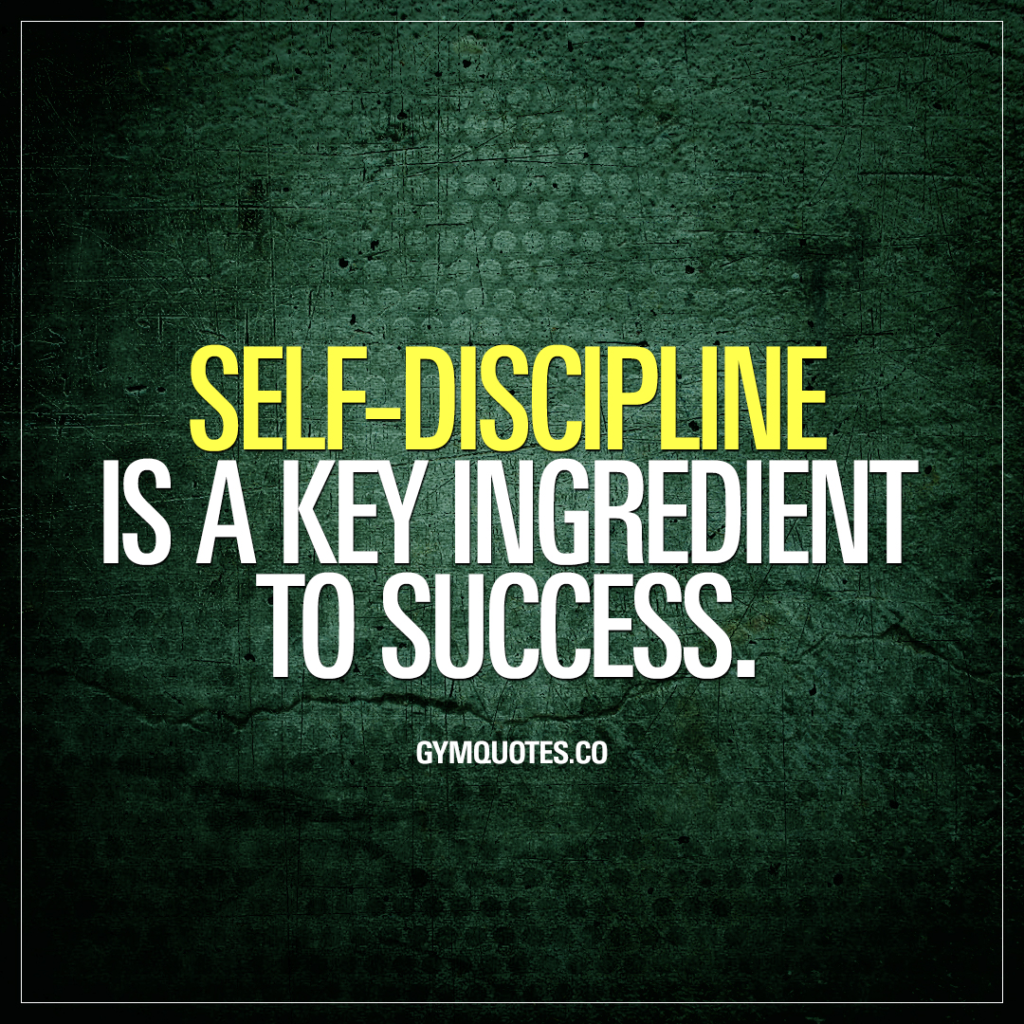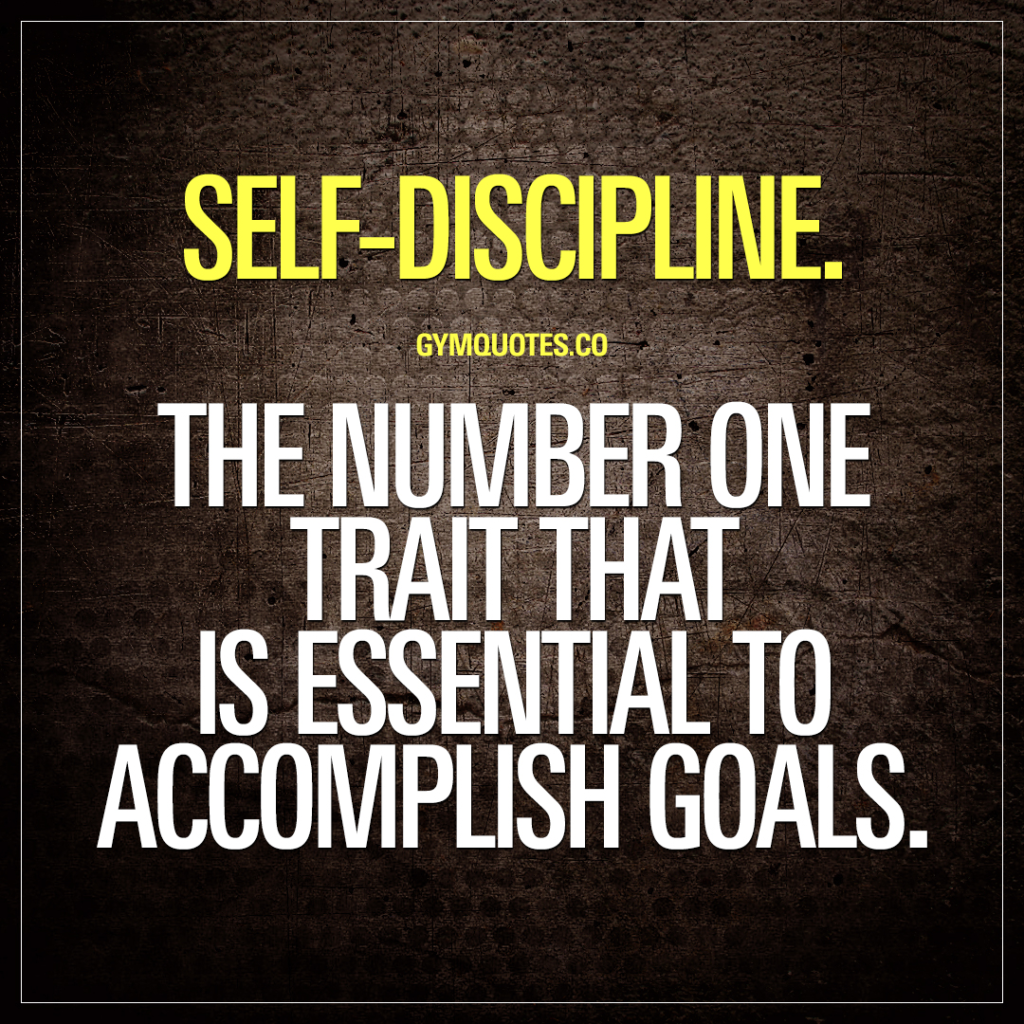Many people are performing below average or are total failures because of low self-discipline.

Picture source: dreamstime.com
Self-discipline is required to achieve optimal health when breaking a habit (e.g., smoking) or rebalancing health issues caused by excess.

Self-discipline allows you to stay focused on your goals. It enables you to stay in control of yourself and of your reaction to any situation. Self-discipline is like a muscle: the more you train it, the stronger you become. Lack of self-discipline can cause low self-esteem.

According to an article in Psychological Science, self-discipline is a better predictor of academic success than IQ. A study found that highly self-disciplined adolescents outperformed their more impulsive peers on every academic-performance variable, including report card grades, standardized achievement test scores, admission to a competitive high school, and attendance.

Pillars of Self-Acceptance
Level 1: Acceptance
Acceptance is the most basic challenge people face. Psychological acceptance refers to the process of embracing thoughts, emotions and other internal experiences without judgement and without trying to change them. People fail to accurately perceive and accept their current situation. It is important to identify an area where your discipline is weakest. Assess where you stand right now. Acknowledge and accept your starting point, and design a program for yourself to improve in this area. There are many studies showing that slowing down, being mindful, and experiencing and expressing gratitude creates new neural pathways and these connections are strengthened as we continue to practice these skills ensuring that they are more likely to occur in the future. In time we will then notice that we are happier, calmer and experiencing more joy.
“It takes a huge amount of fortitude and motivation to accept what is —especially when you don’t like it — and then work wisely and effectively as best you possibly can with the circumstances you find yourself in and with the resources at your disposal, both inner and outer, to mitigate, heal, redirect, and change what can be changed.” (Zin Bat 2005).

Level 2: Harnessing Willpower
According to most psychological scientists, willpower can be defined as: The ability to delay gratification, resisting short-term temptations in order to meet long-term goals. The capacity to override an unwanted thought, feeling, or impulse. Willpower is a concentration of force. Choose your objective. Create a plan of attack and then execute the plan. Your willpower is at its lowest when you feel stressed. This level is the easiest to establish and the most fleeting when undertaking any task.For instance, when you hear someone you admire talk about the benefits of reading, you might feel an overwhelming urge to read and rush to buy a few books. Or, after seeing someone’s journey of losing 30kg on Facebook, you might purchase an annual gym membership and a collection of stylish sportswear the next day.However, those books might only be read a few pages before being set aside. Gym sessions might be skipped due to rainy weather, overeating, or a hectic week.Without a clear goal and strong motivation, self-discipline at this level is like a thin thread, easily snapped with the slightest tension. Acceptance is the most basic challenge people face. They fail to accurately perceive and accept their current situation. It is important to identify an area where your discipline is weakest. Assess where you stand right now. Acknowledge and accept your starting point, and design a program for yourself to improve in this area.
Many people believe they could improve their lives if only they had more of that mysterious thing called willpower. With more self-control we would all eat right, exercise regularly, avoid drugs and alcohol, save for retirement, stop procrastinating, and achieve all sorts of noble goals.

Take, for example, the results of the American Psychological Association’s annual Stress in America Survey. The survey asks, among other things, about participants’ abilities to make healthy lifestyle changes. Survey participants regularly cite lack of willpower as the No. 1 reason for not following through with such changes.
Lack of willpower isn’t the only reason you might fail to reach your goals. Willpower researcher Roy Baumeister, PhD, a psychologist at Florida State University, describes three necessary components for achieving objectives: First, he says, you need to establish the motivation for change and set a clear goal. Second, you need to monitor your behavior toward that goal. The third component is willpower. Whether your goal is to lose weight, kick a smoking habit, study more, or spend less time on Facebook, willpower is a critical step to achieving that outcome.
Level 3. Hard work
Hard work is what many people try to avoid by doing what is easiest. But a strong challenge is commonly connected with strong results. Self-discipline is like a muscle: the more you work on developing it and using it, the stronger it will become. However, it’s just as important not to start out with goals that are too ambitious. Instead, set small goals, and increase the level of challenge slowly over time. Hard work is important because it’s how you show yourself what you can do. It’s this that gives you confidence: the sense that no matter what happens, you have the ability to figure it out. The real value of hard work is that you prove to yourself you can trust you. A hard worker typically exemplifies that behavior in all areas of their life. While it’s difficult to pinpoint the definition of hard work, hardworking people are reliable, consistent, and can be trusted with a wide range of tasks. Without hard work, self-discipline is impossible.

Level 4. Industry
Industry is developing the capacity to put in the time and effort. Industry is not really the same thing as working hard. In contrast to hard work, being industrious doesn’t necessarily mean doing work that’s challenging or difficult. It simply means putting in the time. You can be industrious doing easy work or hard work. When we’re developing self-discipline, we’re often trying to break a bad habit and replace it with something more productive. However, if that habit is tied into a certain time of day or routine, breaking it can leave a hole. If we don’t replace that habit with something else, then its absence becomes even more noticeable. A good example is if you’re trying to stop yourself shopping online when you take a break at work. This bad habit destroys your focus and attention, because you’re likely to be online for 20-30 minutes each time. Once you’ve resolved to stop, identify a new behavior that you can engage in when you need a quick break. Instead of online shopping, you could do some stretches in your office, get a cup of coffee, or take a quick walk outside. These behaviors will help to support your goal and strengthen your self-discipline, instead of leaving you with nothing to do on your break.
How many problems do you have on your to do list right now that can be solved with the simple application of industry? Sometimes you don’t need to be particularly creative or clever about it — a brute force solution will do. But it’s easy to get stuck in a pattern of wishing that a brute force solution wasn’t necessary. It’s tedious. It’s boring. It’s not that important anyway. And yet it still needs to be done.

Level 5. Persistence
Persistence allows you to keep taking action even when you don’t feel motivated to do so, and therefore you keep accumulating results. Persistence will ultimately provide its own motivation. Persistence is self-discipline in action. Persistence is the true measure of individual human character. Your persistence is, in fact, the real measure of your belief in yourself and your ability to succeed. Each time that you persist in the face of adversity and disappointment, you build up the habit of persistence.

As you work on your self-discipline, pay attention to how you’re feeling as it develops and strengthens. You might feel free, happy, proud, and energized. Also, think about keeping a journal to write down your self-discipline goals and to track your progress. This reinforces the positive changes that you’re implementing in your life, and gives you a record that you can look back on to see the progress that you’ve made. Over time, your self-discipline will strengthen, and you’ll be able to apply it to lots of other areas of your life.
Self-discipline becomes very powerful when combined with goal-setting, passion, and planning. Write down your goals once again and make sure that you do everything in your power to stick to them. Always finish any task you set before moving on to start another. For some, the thought of setting a goal may be overwhelming. Reach out for support so you too can experience the satisfaction of achieving a goal that is important to you.
Credits
https://www.proactivehm.com.au/
stevepavlina.com
www.apa.org
https://www.adventisthealthcare.com/
Support Us To Do Better
Dear Reader,
Every day, we work hard to provide our audience with the most comprehensive information that could help to improve a positive and healthy lifestyle. Quality blogging costs money. Today, we’re asking that you support us in doing more. Your support means that Positive Psychology can keep offering quality service to everyone. Pay as little as N1,000 to support us.
Bank transfers can be made to:
Zenith Bank
2250531253
Adebayo Oluwole
Please send details of your bank transfer to our email or WhatsApp number so we can contact you.
If you have any questions, please let us know.
Contact us at Positive Psychology and Educational Consult. At Positive Psychology and Educational Consult, we are ready to help you to navigate your life. Contact us today. Phone: +2348034105253. Email: positivepsychologyorgng@gmail.com twitter: @positiv92592869. facebook: positive.psych.1
